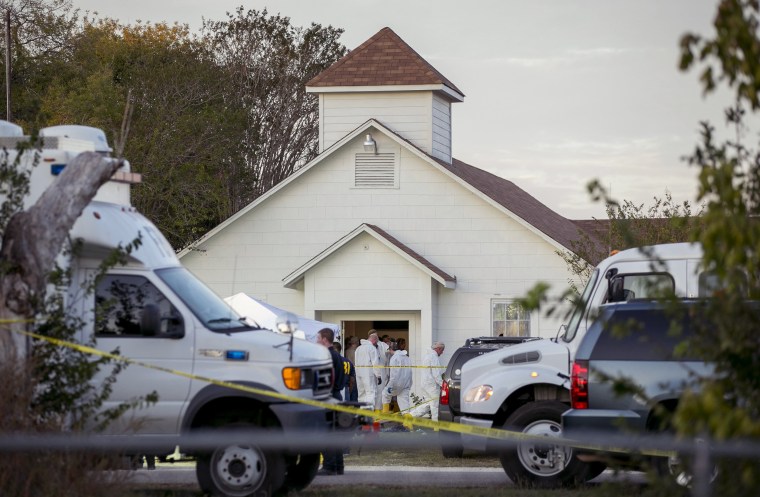With flags at half-staff across the nation, Americans are on our knees this week, weeping and mourning over the babies and grandmothers, husbands and daughters who were gunned down during worship at First Baptist Church in Sutherland Springs, Texas, on Sunday morning. Sheila Pomeroy, who lost her daughter, Belle, along with most of her church family, begged us in her grief to please not forget Sutherland Springs. We cannot.
After months of national debate about taking a knee, another massacre in a sanctuary is a visceral reminder of why our bodies assume this posture when we are mourning. Churches have altars and kneeling benches because they are spaces set aside for us to cry out to heaven for the help that no one on earth can offer. As Luke’s gospel records, in his hour of crisis, our Lord knelt and prayed (Luke 22:41).
We go to our knees in prayer. But in the Christian tradition, our Lord teaches us to ask, “Thy kingdom come… on earth, as it is in heaven.” Though we look to heaven for comfort, God is clear: The answer to our grief lies in the pursuit of love and justice in our common life.
These are vitally important lessons, even if they are becoming harder and harder to hear. According to analysis from Dallas Drake, a criminologist at the Center for Homicide Research in Minneapolis and Carl Chinn, a church-security consultant based in Colorado Springs, Colorado, violent incidents in houses of worship generally are increasing.
Even in sanctuaries, the places where we are supposed to be able leave our suspicions at the door, we are not safe.
This emerging trend doesn’t necessarily mean that shooters are increasingly targeting worshippers, but that this epidemic of mass shootings is spreading so furiously that literally, no corners of our communities are safe anymore. Where we gather, we are targets. Even in sanctuaries, the places where we are supposed to be able leave our burdens and suspicions at the door, we are not safe.
While we as a nation are on our knees, we should be deeply concerned by a President who will not bow, who spouts talking points on the road in Asia that will likely only reinforce the culture of violence that has made mass shootings a regular part of our life in America.
Last week, when an Uzbek man drove a truck into a crowd of people in Trump’s hometown, the President immediately called for restrictions on immigrants and execution of the perpetrator. A non-white, non-Christian perpetrator of violence quickly became a justification for the policy agenda of white supremacy: anti-immigrant legislation and violent retaliation.
But the lone gunman in Sutherland Springs this week, who was white and born in the U.S., evoked a different response from the President: a focus on mental health, not guns. The contradiction of this pivot to defend gun rights is inescapable. Not only did he make it easier for people with mental health issues to get guns; this President has also spent nine months trying to undermine the Affordable Care Act, which aimed to guarantee access to mental health services to all Americans.
In Texas, the state's refusal to expand Medicaid under the ACA threatens its safety net. Meanwhile, population continues to outpace need. New GOP plans could leave as many as 500,000 Texans uninsured by 2020. In Texas, as elsewhere, many of those people are white.
This contradiction exposes the moral malady that threatens the heart and soul of our democracy: By imagining the non-white, non-American to be our enemy, we have constructed a political culture and a war economy that threatens us all.
Does anyone, even the most gun-loving Americans, really want to live in a society where we pray with rifles at our sides?
But on our knees with those in Sutherland Springs, we can see through tears that it doesn’t matter whether the shooter was driven to violence by ISIS, by mental illness, by the moral injury of fighting the “war on terror,” or by the toxic culture of polarization cultivated by groups like the NRA to sell more guns: This culture of violence threatens to kill us all.
If a few professional athletes took a knee in mourning over the young black men and women who have fallen victim to this culture at the hands of police, then the time has now come for all Americans to join them.
Because ultimately, if our churches are not safe, then none of us are safe. Does anyone, even the most gun-loving Americans, really want to live in a society where we pray with rifles at our sides? If we fortify our churches, won’t our hearts be next? Can we truly love our neighbor if we pat him down at the door?
From the Sikh gurdwara in Oak Creek to Mother Emmanuel in Charleston to First Baptist in Sutherland Springs, I pray people of faith can unite across the false divisions of race and party to cry out to God in this moment — and stand together to reconstruct a public life that doesn’t depend on imagined enemies.
The Rev. Dr. William J. Barber, II is President of Repairers of the Breach and author of "The Third Reconstruction" with Jonathan Wilson-Hartgrove, who directs the School for Conversion. Together with other clergy and moral activists, they are both preparing for The Poor People’s Campaign: A National Call for Moral Revival.
